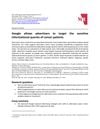 7 citations,
September 2023 in “Cancer Treatment Reviews”
7 citations,
September 2023 in “Cancer Treatment Reviews” Managing side effects of endocrine therapy is crucial to improve adherence and survival in breast cancer patients.
December 2022 in “Journal of The American Academy of Dermatology” Low-dose oral minoxidil combined with topical minoxidil improves hair growth in breast cancer patients with therapy-induced hair loss.
 90 citations,
December 2007 in “Current Oncology”
90 citations,
December 2007 in “Current Oncology” Non-hormonal treatments should be used first for sexual dysfunction in postmenopausal breast cancer patients on aromatase inhibitors, with hormones as a second option.
[object Object] 12 citations,
February 2019 in “Journal of patient-reported outcomes” Patients with HR+/HER2- advanced breast cancer commonly experience fatigue, hair loss, and pain, which significantly affect daily activities.
 December 2022 in “BMC women's health”
December 2022 in “BMC women's health” The CNC® prosthetic system improved body image in breast cancer patients with hair loss from chemotherapy but did not significantly change their psychological wellbeing.
24 citations,
May 2015 in “Molecular and clinical oncology” Honey and bee pollen can help reduce menopausal symptoms in breast cancer patients.
 1 citations,
November 2019 in “Archives of breast cancer”
1 citations,
November 2019 in “Archives of breast cancer” Some hormone treatments might raise breast cancer risk, while others don't seem to.
 April 2024 in “Academic dermatology”
April 2024 in “Academic dermatology” Dermatologists should carefully manage hair loss in cancer patients to improve their quality of life.
 1 citations,
July 2023 in “Cancers”
1 citations,
July 2023 in “Cancers” Skin side effects from CDK4/6 inhibitors in breast cancer patients are generally mild and treatable, allowing most patients to continue treatment.
 37 citations,
September 2018 in “The Journal of Clinical Endocrinology and Metabolism”
37 citations,
September 2018 in “The Journal of Clinical Endocrinology and Metabolism” Intravaginal testosterone cream improves sexual satisfaction and reduces vaginal discomfort in postmenopausal women on breast cancer treatment without affecting hormone levels.
 January 2023 in “Cancer research, statistics, and treatment/Cancer research, statistics and treatment”
January 2023 in “Cancer research, statistics, and treatment/Cancer research, statistics and treatment” Vijaya successfully fought stage 2A breast cancer with surgery, chemotherapy, radiotherapy, and hormone therapy, while advocating for support groups.
 1 citations,
January 2021 in “Journal of Cancer Therapy”
1 citations,
January 2021 in “Journal of Cancer Therapy” Regenerative medicine may help reduce radiotherapy side effects like skin cancer, fibrosis, pain, and hair loss.
 June 2017 in “Journal of evolution of medical and dental sciences”
June 2017 in “Journal of evolution of medical and dental sciences” About 22% of cancer patients had skin-related side effects from chemotherapy, but these were usually not severe enough to halt treatment.
 37 citations,
February 2013 in “Maturitas”
37 citations,
February 2013 in “Maturitas” Testosterone therapy is beneficial for women's health and does not cause masculinization or liver damage, and it protects the heart and breasts.
 7 citations,
April 2012 in “Clinical investigation”
7 citations,
April 2012 in “Clinical investigation” Transdermal testosterone can improve sexual desire in postmenopausal women but lacks long-term safety data and is not FDA-approved for this use.
March 2023 in “Journal of Cosmetic Dermatology” Low-dose oral minoxidil improved hair growth when topical treatments failed.
 December 2023 in “Trials”
December 2023 in “Trials” The trial is testing if a helmet that uses light can prevent hair loss during chemotherapy.
 19 citations,
July 2020 in “Journal of cancer survivorship”
19 citations,
July 2020 in “Journal of cancer survivorship” People undergoing chemotherapy need better support and information to cope with hair loss.
 June 2011 in “Oncology times”
June 2011 in “Oncology times” New treatments are making advanced prostate cancer management more complex but also more hopeful.
[object Object]  53 citations,
April 2018 in “Journal of The American Academy of Dermatology”
53 citations,
April 2018 in “Journal of The American Academy of Dermatology” Cancer treatments often cause hair disorders, significantly affecting patients' quality of life, and better management methods are needed.
 1 citations,
January 2018 in “Springer eBooks”
1 citations,
January 2018 in “Springer eBooks” The document concludes that scalp cooling and treatments like minoxidil can help manage hair loss from cancer therapy.
 12 citations,
December 2016 in “International journal of nursing practice”
12 citations,
December 2016 in “International journal of nursing practice” Puerto Rican children with cancer often experience symptoms like irritability, nausea, and hair loss, and need better education and continuous symptom management.

Google should ban ads targeting cancer patients with sensitive health-related keywords to protect them from misleading information.

Ayurvedic herbs may reduce side effects and improve effectiveness of cancer treatments.
 5 citations,
October 2018 in “Research in psychotherapy”
5 citations,
October 2018 in “Research in psychotherapy” The Italian version of a relationship scale was adapted for cancer patients, showing some differences from the original and suggesting its use could improve therapy and treatment adherence.
 1 citations,
July 2020 in “Bezmialem science”
1 citations,
July 2020 in “Bezmialem science” Reflexology massage helps hair regrowth in women after chemotherapy.
 15 citations,
February 2017 in “Nursing Clinics of North America”
15 citations,
February 2017 in “Nursing Clinics of North America” Targeted cancer therapies can cause skin side effects, which should be treated early to help patients' quality of life and treatment adherence.
 7 citations,
October 2019 in “Klinická onkologie”
7 citations,
October 2019 in “Klinická onkologie” Cancer treatments often cause hair loss and damage, affecting patients' mental health.
 26 citations,
August 2018 in “American Journal of Clinical Dermatology”
26 citations,
August 2018 in “American Journal of Clinical Dermatology” Hair loss in cancer patients can be related to the cancer itself, treatment, or other conditions, and understanding it is important for diagnosis and patient care.
 February 2023 in “Sibirskij onkologičeskij žurnal”
February 2023 in “Sibirskij onkologičeskij žurnal” Chemotherapy often causes hair loss in cancer patients, affecting their mental health, but scalp cooling can help prevent it.


























